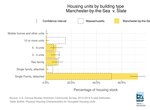

At its meeting Monday, the Planning Board heard from a community housing study group seeking to widen options for Manchester’s older residents, young professionals, single individuals and local employees with a new housing bylaw amendment that would allow accessory dwelling units (ADUs) throughout town.
The Housing Zoning Study Group, comprised of volunteer residents that include several architects and consulting members from the Affordable Housing Trust, has been studying the challenge of Manchester’s housing future in the face of escalating median home prices and resident demographics that don’t fit the town’s future housing picture. Local architect Gary Gilbert formed the group several months ago to study the local housing issue. The task? Figure out how to expand entry-level housing—options that aren’t formal state regulated “Affordable Housing” but rather affordable, entry-level options for the community—in ways that are proven and easily implemented.
After research and study, the idea of allowing accessory dwelling units in ways already familiar to residents, such as “au pair suites” or small in-law apartments, became an idea that seemed to fit. The group then looked to liberalize the town’s existing bylaw on housing special provisions.
“It’s a fairly simple way to retain the look and feel of the town,” said Gilbert, while at the same time, “instantly expanding housing.”
He said Manchester, like other municipalities such as Rockport and Barnstable, is well above the state’s average for single family homes. That may not have been much of a challenge ten or 20 years ago. But today, Manchester’s population is flat, and its fastest growing resident group is over age 60. An aging population needs downsized, simplified housing, he said. So do young professionals, local employees such as police officers, teachers and town employees.
The challenge is the housing mix in Manchester is parched of simple, lower-cost housing. According to the Massachusetts Housing Partnership’s Center for Housing Data, 73 percent of housing units in Manchester are single family homes. The state’s average is 53 percent, and the average of the ten nearest communities to Manchester is 67 percent. All this, while the median value for a single-family Manchester home has increased 17 percent in eight years, according to Manchester Principal Assessor Ginny Noyes Thompson, moving from $654,100 in 2011 to $766,400 in 2019.
The idea of allowing ADUs is something of a trend in towns with similar challenges. In Barnstable and Rockport, the idea of building an additional small rental unit to an existing single-family house has not only been adopted but it’s actively encouraged. In Essex, housing challenges are compounded by big growth in its resident population (18 percent in 20 years), and ADUs are already allowed by right and are seen as a good option for residents who are facing the unsavory choice of selling their homes without good options to remain in town, or they stay homes that no longer suit their life stage.
Gilbert told the board ADUs here in Manchester could be a key to supporting a much-needed varied population in Manchester and expand its economic base, it’s important to increase the number of lower cost rental housing units. Sensibly done, he said, encouraging the development of ADUs will easily and quickly provide the town additional housing options, but do it primarily within existing buildings and therefore preserve the look and character of the town.
How would this work? Gilbert presented specific elements to the proposed bylaw. It would allow one ADU per resident as a matter of right in all Manchester’s zoning districts that require owner-occupancy. The ADUs would also be limited in size to two bedrooms or 1,200 square feet to be sure they function as apartments and their price kept on the low-end of the market. They would require one dedicated parking spot for the unit and would have to be rented for more than 30 days so they couldn’t be “Airbnb’d”. They would also require a license renewal with the town every three years. Finally, said Gilbert, they couldn’t be turned into condominiums and sold.
Planning Board member Gary Russell said ADUs make sense. In his observation, he said, it’s harder today for Millennials to purchase a first home than in the past. According to a January 2020 article in the Economist, in 1990 Baby Boomers with a median age of 35 accounted for a third of the country’s total real estate value. By 2019, a similarly sized cohort of Millennials, age 31, owned just four percent.
“I’m all for this,” said Russell. “It’s a good and easy way to increase affordable options.” Russell went on to say success will be in details, especially defining “existing buildings” (kept to a reasonable square footage and conforming to all the existing regulations and lot limitations such as setbacks).
Board Chairman Ron Mastogiacomo asked if the group had explored the implications on town infrastructure such as water and sewer. Gilbert said they had. He said building permits be necessary for any of these apartments to be created or to get existing in-law apartments legalized and into the system. This is good for the town because we can be sure places are built safely and up to code and that’s certainly not an excessive burden to the homeowner either. ADU’s will also likely be easier to create in dwellings already connected to town water and sewer. He also said the average town in Massachusetts that has embraced ADUs have seen an average of ten new units per year. If that pace stands here in Manchester, it’s likely the infrastructure impact would be easily managed.
Monday’s preview is just the beginning for this proposed idea and certainly the bylaw. Gilbert said the next step in his group’s process is to continue seeking buy-in from several more town boards (including the Board of Selectmen) and then conduct a series of public forums for resident input before a bylaw is presented to voters at Town Meeting, likely in the Fall, and in conjunction with the comprehensive bylaw reviews that is already ongoing.